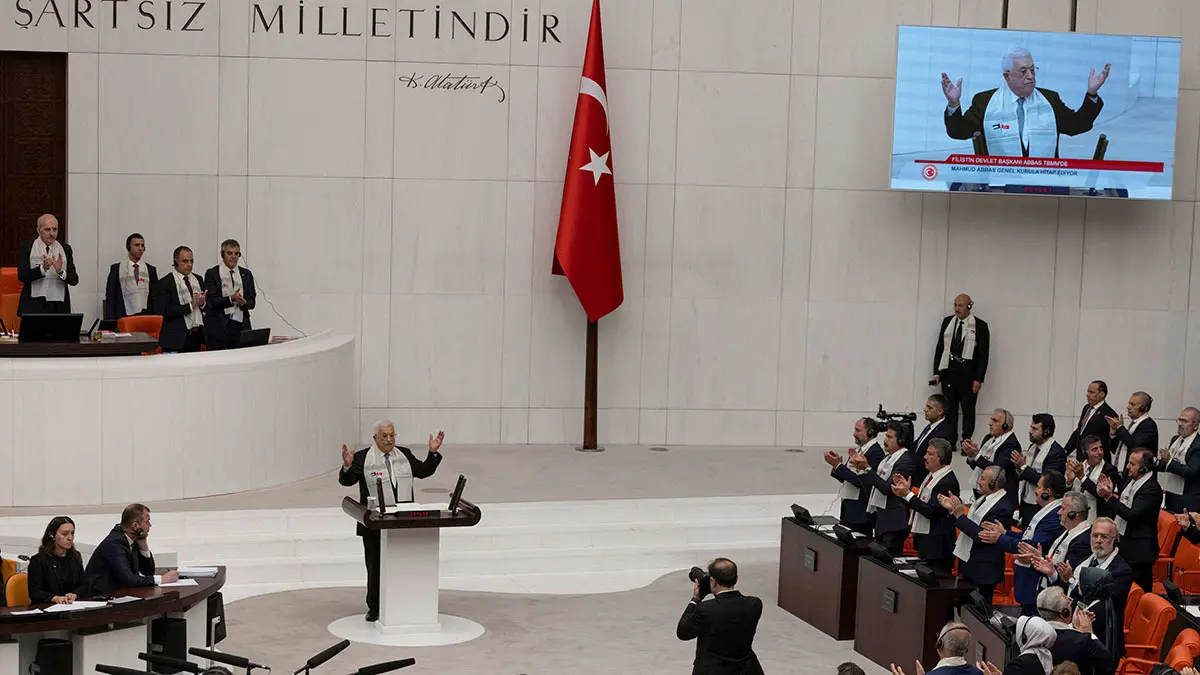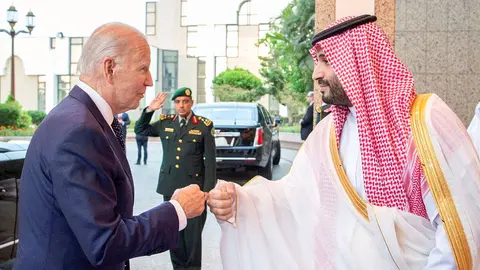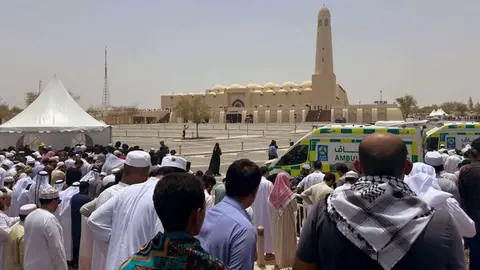Exit Turkey and Qatar, enter Iran

Turkish state media celebrated the address delivered by Palestinian President Mahmoud Abbas at the Turkish parliament in the presence of President Recep Tayyip Erdogan.
Some wanted us to believe that Abbas speaking to the Turkish legislature about the war in Gaza was the response to Israeli Prime Minister Binyamin Netanyahu’s address of the US Congress.
Abbas tried to inject additional drama into the event by vowing to travel to Gaza along with Palestinian Authority members. Of course, Abbas is not Netanyahu, and the Turkish parliament is not the US Congress. The event was already forgotten a day later, and the world’s sights turned to the Doha negotiations.
Much has changed since the assassination of Hamas Political Bureau Chief Ismail Haniyeh in Tehran. With Haniyeh’s departure, Turkey appears to be one of the biggest losers in the Middle East power play. In Doha, an exceptional development has altered the course of the conflict. The mediated negotiations in Doha are supposed to be an attempt to defuse the ongoing regional crisis sparked by Operation “Al Aqsa Flood."
The current round of negotiations is of exceptional importance due to the regional and international desire to prevent the expansion of the conflict into a direct or proxy war between Iran and Israel. But what actually happened is that Iran has managed to reserve a seat at the negotiating table. This may not have been quite clear after the first call by Qatari Prime Minister and Foreign Minister Sheikh Mohammed bin Abdulrahman Al Thani to Iran’s acting Foreign Minister Ali Bagheri Kani. But Sheikh Mohammed’s second phone call in less than 24 hours to Kani left no room for any doubt about the importance of Iran’s role in the ongoing developments in Doha and for it strong presence, if not its key role as a stake holder at the negotiating table. The call made by Egyptian Foreign Minister Badr Abdel Aty to the Iranian minister merely confirmed this reality.
There are two scenarios one could imagine in the Doha-Tehran phone calls. One you might call the naive scenario. It might have gone like this: the Qatari minister starts the conversation saying: “Hello, Your Excellency. I am sitting now with the head of the Israeli Mossad, David Barnea, the director of the US Central Intelligence Agency, William Burns and the head of Egyptian intelligence services, Abbas Kamel. They want you not to rush your response as you have not done so far, and that things seem to be heading towards a breakthrough”.
The second scenario is perhaps more realistic. It would go like this: “Hello, Your Excellency. We need you to pressure Yahya Sinwar into accepting Israeli conditions so that both of us can find a way out of the crisis. Perhaps this is a message that the late Ismail Haniyeh would have conveyed to you, but I find myself compelled to convey it to you directly since you are the ones who have the final say on Hamas now”.
There is no doubt that Haniyeh was forced to coordinate with the Iranians. Since the day he left Gaza and handed over the management of the internal affairs of Hamas to Sinwar, Ismail Haniyeh, as Qatar’s and Turkey’s man, became a mere political front for the movement under the title of head of the political bureau of Hamas.
After Operation “Al Aqsa Flood,” he found himself in the middle of the action, first defending the Hamas operation, then calling for a halt to the war, and finally negotiating on behalf of Hamas in the search for a truce and the exchange of captives and detainees.
Haniyeh went to Tehran more than once, and one can imagine now these visits were aimed at exerting pressure on Sinwar. Eventually Israel found in Haniyeh an easy and visible target it could strike in order to give the impression of having the upper hand in retaliating against Palestinians. Now there is no prominent Hamas figure who can speak on behalf of the movement abroad, Khaled Meshaal included. Matters are in the hands of Yahya Sinwar, and Sinwar is in the hands of Tehran. Hamas may not be sitting at the negotiating table in Doha nor Cairo, but it has been present via the Qataris. However, things have changed, and Iranian negotiators are present via the phone calls. Some may wonder what happened to Iranian retaliation more than two weeks after Haniyeh’s assassination. The answer is this: Iran is now present at the negotiating table regardless of what everyone else feels about this. This is a retaliation.
It is not pondering how and if to respond, but is rather looking with elation at its newly-acquired position at the table, among those who have a say in deciding the fate of the region. Tehran has been playing on everyone’s nerves over the past weeks in order to occupy this new position. Who provided it with this position? Undoubtedly, it is Hamas, with its implementation of Operation “Al Aqsa Flood” and Israel, with its savage retaliation in Gaza at the expense of innocent civilians. But Hamas would not have reached this point had it not been the support received over the years, financially from Qatar, morally from Turkey, and from an operational perspective from the vast regional and global Muslim Brotherhood network.
There is nothing new in saying that Turkey has invested a lot in Hamas. To be fair, the investment was mutual. Erdogan’s regional stock rose with Hamas’ praise for him, even before his posturing about breaking the Gaza blockade and the 2010 Mavi Marmara operation of the so-called Freedom Flotilla (which has basically disappeared without a trace since the current Gaza war).
For a while, Erdogan was the neo-Ottoman sultan rushing to liberate Palestine. Doha took care of the financial and media details. Along with the Turkish-Qatari presence in Hamas decision-making, Iranian influence was beginning to be felt. The Turks and Qataris finance and host conferences where they also speak. They instigate Muslim Brotherhood-led demonstrations around the world denouncing Israel and praising Hamas (at the expense of the Palestinian Authority and its troubled president, Mahmoud Abbas). But they did not dare provide Hamas with weapons. This was a task assumed by Iran and its extensive regional proxy network. With weapons, Iran’s clout grew. One of the fundamentals of the militant Palestinian movement rested thenceforth on the existence in its midst of a wing loyal to Iran, which appeared on the surface to be under the influence of the then-member of the Political Bureau, Mahmoud al-Zahar, but reality was much deeper than that.
Despite the politically confused Hamas positions on the uprising against Bashar al-Assad and the inclination of some of its leaders to favour the Turkish-Qatari position, especially after Hamas left Damascus and settled between Doha and Istanbul, Iran did not sever its ties with the militant Palestinian movement, but on the contrary, strengthened them as it realised that investing in the hardline faction within Hamas was a worthy investment.
Tehran found its way to Yahya Sinwar, who was able to remove Haniyeh from the leadership of the authority in Gaza, while inventing the notions of the Hamas home front and the Hamas outside front. In fact, the outside front has two facets, one cosmetic and manifesting itself in the hotels of Doha under the leadership of the duo Haniyeh-Meshaal, and another led by Saleh al-Arouri and exercising an effective role from the suburb of Beirut under the control, guidance and training of Hezbollah and the Revolutionary Guards.
Operation “Al-Aqsa Flood” was not only directed against the Israelis in the Gaza envelope area. It ushered in, from Iran’s point of view, Tehran’s complete control over Hamas, and through it control over Palestinian affairs.
Qatar’s withdrawal of its support for Hamas was the first expected outcome of the operation. Doha would not have continued to play any role in conjunction with Hamas had it not been for US pressure it to act as a mediator. As for the Turks, they were taken by surprise and showed utter confusion after the first weeks and months of the Gaza war. Apart from rhetorical protests over Israel’s crimes against innocent Palestinians in Gaza, Ankara maintained trade relations with Israel until the eighth month of the war, before suspending them partially and conditioning their resumption on food and medical deliveries into the besieged and destroyed enclave In the Strip.
Erdogan received Ismail Haniyeh more than once after the war erupted without offering anything tangible, not even financial support to help alleviate the woes of the displaced. Then, Turkish diplomacy came up with the idea of joining the South African lawsuit against Israel before the International Court of Justice. Erdogan realised the extent of his loss of influence over the Palestinians, and moreover understood that it was not possible to push the Qataris to continue financing Hamas.
The assassination of Ismail Haniyeh in Tehran further amplified the impact of the loss. Erdogan realises that Haniyeh was the well-known face of Hamas and that Sinwar is not only Iran’s man, but also a political pariah in Israel and the US. Erdogan was accordingly forced to seek Mahmoud Abbas’ help. A real paradox that adds to the many other paradoxes of the Turkish president. Today, he is seeking help from Abbas after spending years investing in Hamas based on the premiss that the movement is the future of the Palestinian cause and that Abbas’ authority is nothing but a remnant of the fading legacy of the Oslo Accords.
No one today is seeking Erdogan’s opinion nor asking him to influence Hamas during the Doha negotiations. Even the standing ovation for Abbas in the Turkish parliament did not draw attention to Erdogan or Abbas. The new seat at the table at the truce talks has been reserved for Iran.
Haitham El Zobaidi is the Executive Editor of Al Arab Publishing House.



